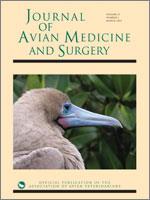Polymerase chain reaction (PCR) assays are available for detection of birds infected with avian polyomavirus (APV). Several laboratories offer this diagnostic assay in the United States, but little information is available regarding assay sensitivity, specificity, and accuracy. In this study, known APV-positive and APV-negative samples (each n = 10, 5 undiluted and 5 diluted) were sent to 5 commercial laboratories. A significant difference in reporting accuracy was found among laboratories, most notably for dilute APV-positive samples. Two out of 5 laboratories provided 100% accurate results, 1 had an accuracy of 90%, and 2 reported 80% and 75% accuracy, respectively. The accuracies of the last 2 laboratories were negatively affected by test sensitivities of 60% and 50%, respectively. These findings show that although accurate results were reported by most laboratories, both false-positive and false-negative results were reported by at least 3 laboratories, and false-negative results reported for dilute APV-positive samples predominated. These study findings illustrate a need for veterinary diagnostic laboratories to institute improved voluntary quality control measures.
How to translate text using browser tools
1 March 2013
Laboratory Reporting Accuracy of Polymerase Chain Reaction Testing for Avian Polyomavirus
Brenna Fitzgerald,
Geoff Olsen,
Brian Speer
ACCESS THE FULL ARTICLE
accuracy
Avian
avian polyomavirus
diagnostic tests
polymerase chain reaction
psittacine
Quality control





